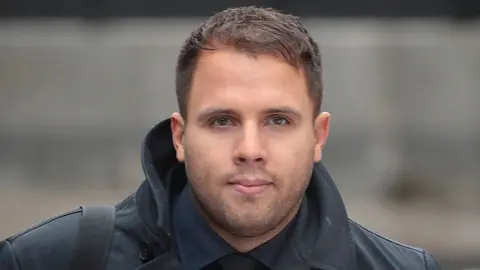Dan Wootton tricked colleague into sending intimate pictures, court told
 Getty Images
Getty ImagesA former colleague of Dan Wootton was tricked by the journalist and broadcaster into sending intimate pictures and an explicit video of himself, according to a case lodged at the High Court.
A hearing on Tuesday heard that Mr Wootton pretended to be a woman, using the name "Maria Joseph", in online messages with the man who has brought this case, who can't be named.
In written submissions, the individual's barrister Justin Levinson told the court that Mr Wootton sent the man partially and naked photographs of a woman, as well as a video of a couple having sex, in 2010.
Mr Levinson said the man had been deceived by Mr Wootton into believing he had been exchanging messages with the woman in the images.
The hearing heard that as a result, the man thought he was talking to a woman who was interested in a sexual relationship, and that as a result he sent intimate photographs and a video of himself carrying out a sex act.
Mr Levinson told the court that Mr Wootton had "tricked the claimant into providing these images".
The man subsequently became aware that "Maria Joseph" did not exist, and that he had in fact sent the images to Mr Wootton.
The man has now brought a claim against the former Sun and GB News journalist, alleging he had been the victim of "obtaining sexual images" by deceit, and that it resulted in him "suffering injury (including psychiatric injury)".
The case is at an early stage and Mr Wootton has not yet filed a defence to the claim.
At Tuesday's hearing, Mr Wootton asked the court to allow the man to be named publicly.
Mr Wootton's barrister Samuel Rowe argued that when a court order was made earlier this year granting the man anonymity, Mr Wootton was not given sufficient notice to be able to challenge it in court.
This was rejected by Judge Roger Eastman.
Mr Rowe also argued that if the court had been told some relevant information, it would have been justified in not granting the order.
Mr Rowe said these matters included the fact that Mr Wootton had been investigated by the Metropolitan Police and Police Scotland in connection with the allegation that he used fake online identities to obtain explicit images without consent, and that both forces had concluded that no further action would be taken and ended their investigations.
Mr Levinson told the court that as far as he was aware, those investigations did not relate to the claimant's complaint, but to similar ones.
The judge again said those issues were no reason for lifting the anonymity order.
In addition, Mr Rowe argued that granting anonymity offended the principle of open justice.
The judge rejected that argument and said there was "clear evidence of potential adverse and seriously adverse effects on the claimant if the claimant's name being in the public domain in this case".
